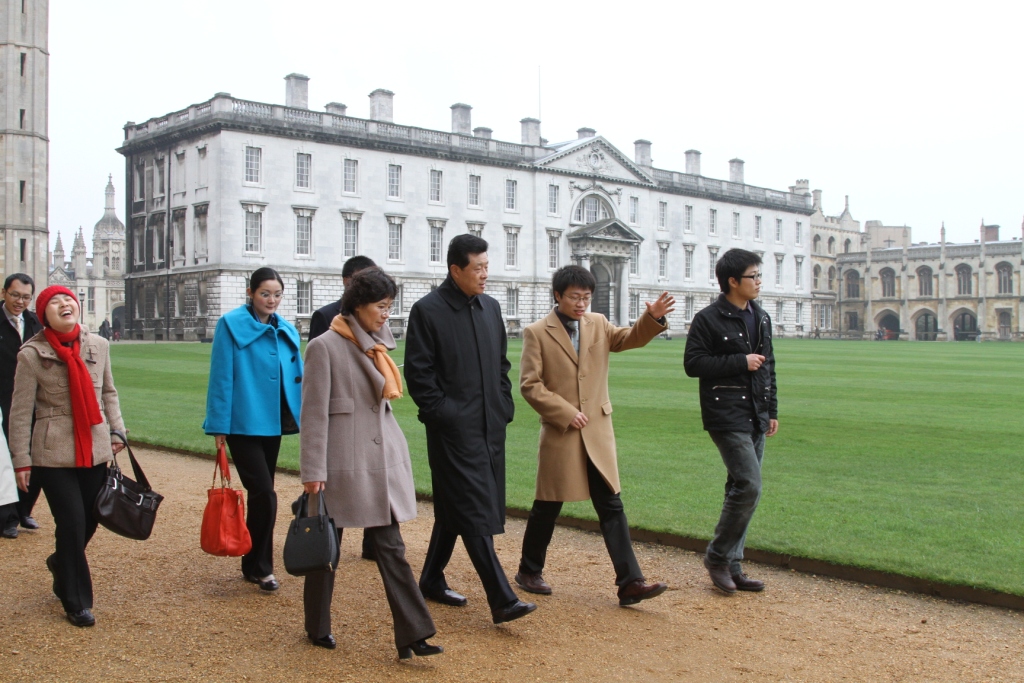
(Ambassador Liu and Madam Hu talk with Chinese students at the University of Cambridge)
On February 22, when Britain was in early spring, with green, sprouting twigs seen on the trees everywhere, in the morning mist of the small town and the gurgle of the River Cam, Ambassador Liu Xiaoming and Madam Hu Pinghua visited the over 800-year-old University of Cambridge to explore the history of the cultural exchanges between China and the UK and introduce to the staff and students of the University China's road to comprehensive development.
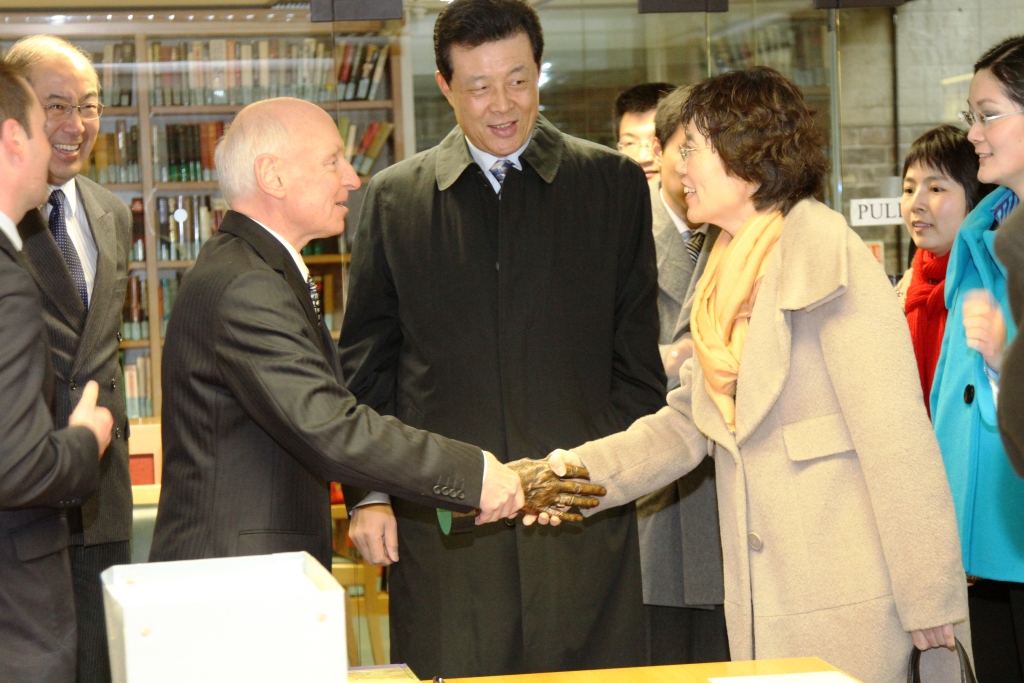
("Shake hands" with Churchill - Master Wallace shakes hands with Madam Hu Pinghua holding Sir Winston Churchill's hand model)
Ambassador Liu first visited the Churchill College and made a tour around the archives centre with accompany of Sir David Wallace, Master of the College, and others. The precious archives, including the 3,000 letters, documents and speech drafts of Prime Minister Winston Churchill, especially the telegrams and letters about China around World War II, as well as the photos about Prime Minister Margaret Thatcher's visit to China, vividly reproduced the history of the China-UK exchanges.
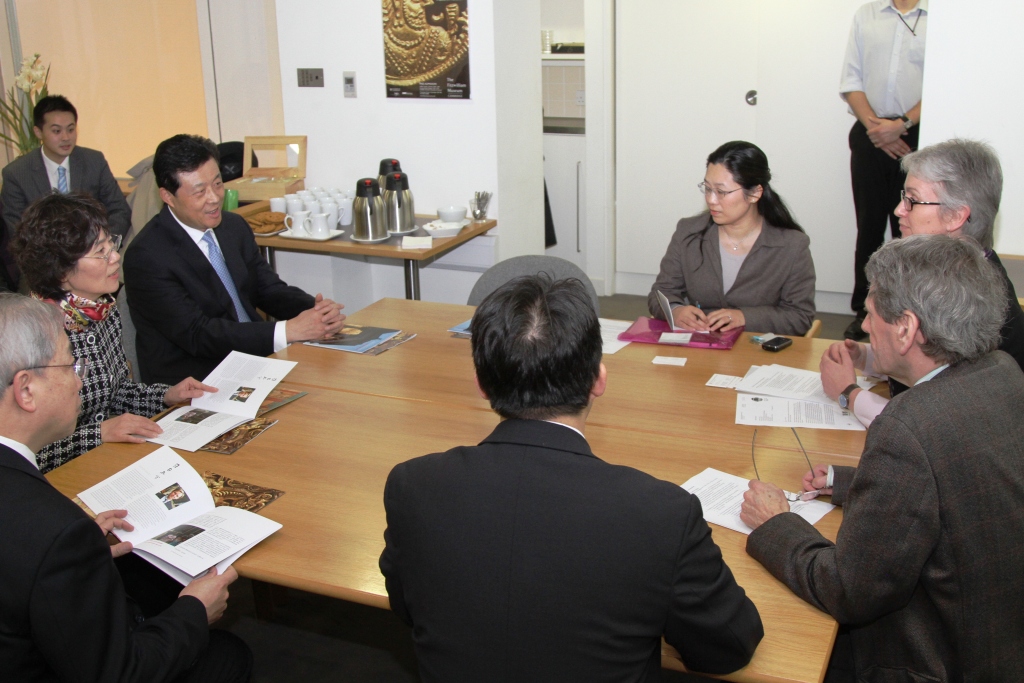
(Ambassador Liu discusses with Director of Fitzwilliam Museum and others)
Subsequently, Ambassador Liu and his party visited the Trinity College, King's College and the Fitzwilliam Museum. On the grass slope alongside the River Cam, a white stone tablet stands quietly, engraved with Mr. Xu Zhimo's lines of poem: "Quietly I said adieu, as quietly as I arrived; By flicking my sleeves, I left every cloud behind." The meaningful and sincere verses recorded a much-told story in the cultural exchanges between China and the UK.

(Director Cullen presented Ambassador Liu the "Science and Civilisation in China")
In the Needham Research Institute, Professor Christopher Cullen, the Director of the institute reeled off the life and talent of Dr. Joseph Needham to Ambassador Liu and his party. Many Westerners only know that the Chinese would write poetry, but do not know China is a big country of science and technology. It is the "Science and Civilisation in China" compiled under the leadership of Dr. Joseph Needham that opened the treasure of science and civilisation in China to the Western people. Ambassador Liu left a message on the guest book: "A master living forever in China-UK friendship".
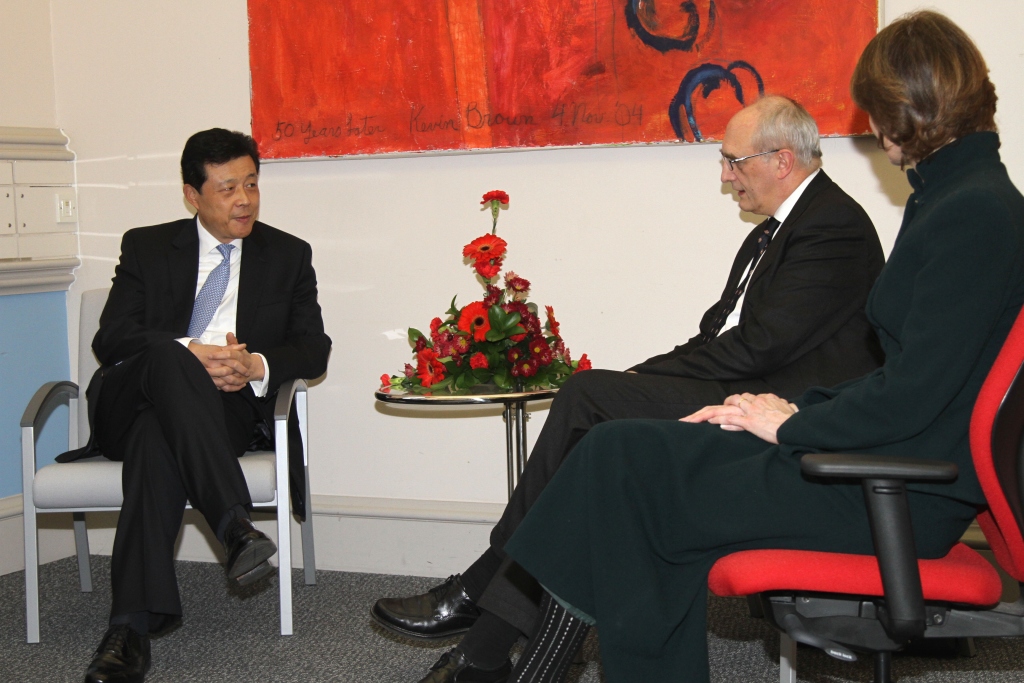
(Ambassador Liu calls on Vice Chancellor Borysiewicz)
Ambassador Liu called on Vice Chancellor Sir Leszek Borysiewicz. The Vice Chancellor introduced the progress in the cooperation between Cambridge and Chinese universities and research institutions, talked about his deep impression on his trip to China last year for the closing ceremony of the Shanghai World Expo, highly commended China's achievements in development and expressed the willingness of Cambridge to work more closely with China to strengthen academic exchanges and cooperation and jointly cope with the challenges facing the world. He also recalled the discussion with Ambassador Liu last autumn on how to strengthen Cambridge's researches in contemporary China, saying that in recent years, the British academic circle is increasingly enthusiastic in China studies, Ambassador Liu's proposal that Cambridge should strengthen the researches in contemporary China greatly impressed him and he had instructed the relevant professors and scholars in Cambridge to make in-depth studies, integrate resources and build China studies into a pillar research project of Cambridge.

(From left: Madam Hu Pinghua, Ambassador Liu Xiaoming, Vice Chancellor Sir Leszek Borysiewicz, and Pro-Vice-Chancellor Dr. Jennifer Barnes)
Ambassador Liu commended the commitment of Cambridge to strengthening the exchanges and cooperation with China. He said that the Chinese side values the cooperation with the University of Cambridge, that he hoped both sides would give full play to their advantages in resources and actively carry out more substantive cooperation and exchanges, and that he expected the University of Cambridge to become a leading institution in the British academic circle for the contemporary China studies under the leadership of the Vice Chancellor and to make greater new contributions to strengthening mutual understanding between China and the UK and promoting the development of the bilateral relations.
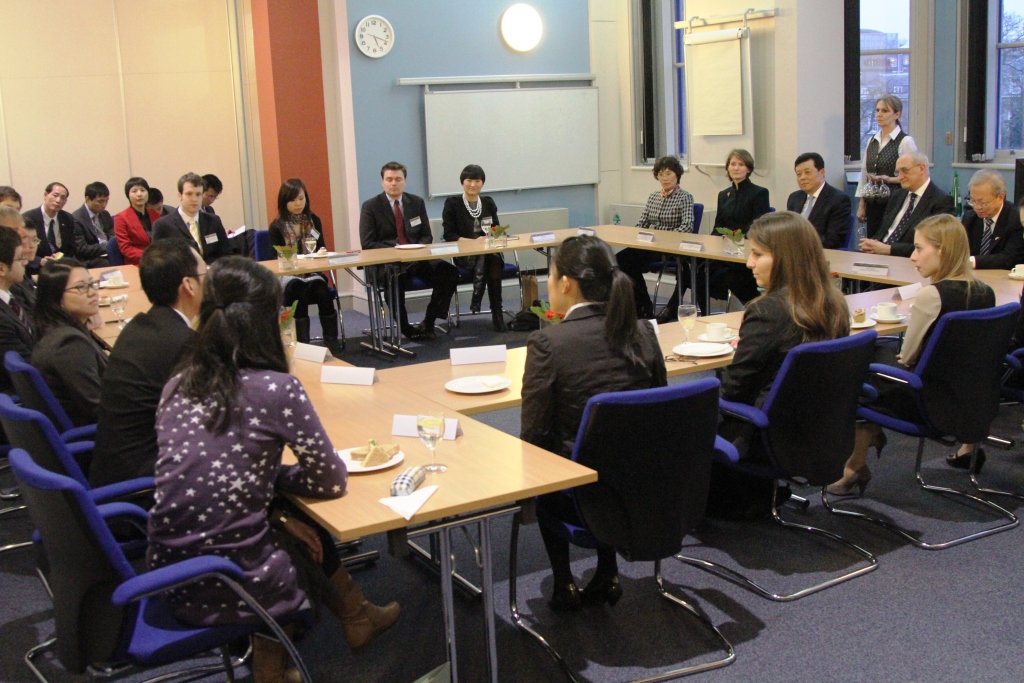
(Ambassador Liu discusses with the student representatives from different colleges of Cambridge)
Accompanied by Vice Chancellor Borysiewicz, Ambassador Liu had a discussion with the student representatives from various colleges of Cambridge. The students seized the rare opportunity to raise questions on China's domestic development, the country's international role, China-UK relations, China-EU relations, China's Middle East policy, cultural exchanges between China and the West, job opportunities for overseas students after graduation, policies attracting overseas students to return and other issues. Ambassador Liu answered all the questions and encouraged the students to participate more actively in the China-UK exchanges and cooperation.
At 6 o'clock in the evening, the visit reached its height: Ambassador Liu, accompanied by Vice Chancellor Borysiewicz, arrived at the well-known Judge Business School to deliver a speech to over 200 Cambridge faculty members and students.

(Ambassador Liu Delivering Speech)
Taking "The Road to Success and Comprehensive Development" as the title and taking into account the hot topic of China surpassing Japan in GDP, Ambassador Liu discussed four issues: What does China being the second largest economy tell us? How soon is China going to be number one? Will China be able to sustain such rapid growth? What does China's development mean to the world?
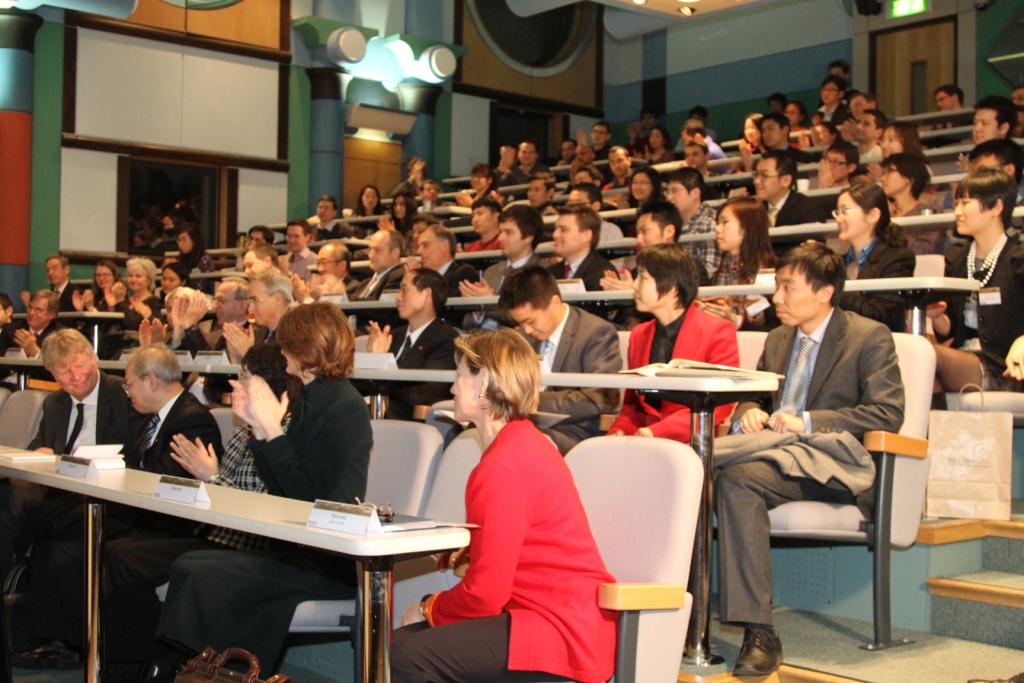
According to Ambassador Liu, the fact that China rolls in at number two tells the successful story of China's development. This success comes from the country's commitment to a development model well suited to its national conditions and to the reform and opening-up policy. China's reform and development are not only about the reform and development of the economic system, but also about making comprehensive progress in political, social and cultural spheres. Although China ranks the second in terms of GDP, it still faces a long road of development. The situation of high aggregate but low per capita is not changed, the regional development gap remains large, the country has a long way to go before transforming from "made in China" to "created in China", and the Chinese economy is yet to be transformed from extensive to intensive development. Therefore, development will remain a top priority for China for a long time to come.

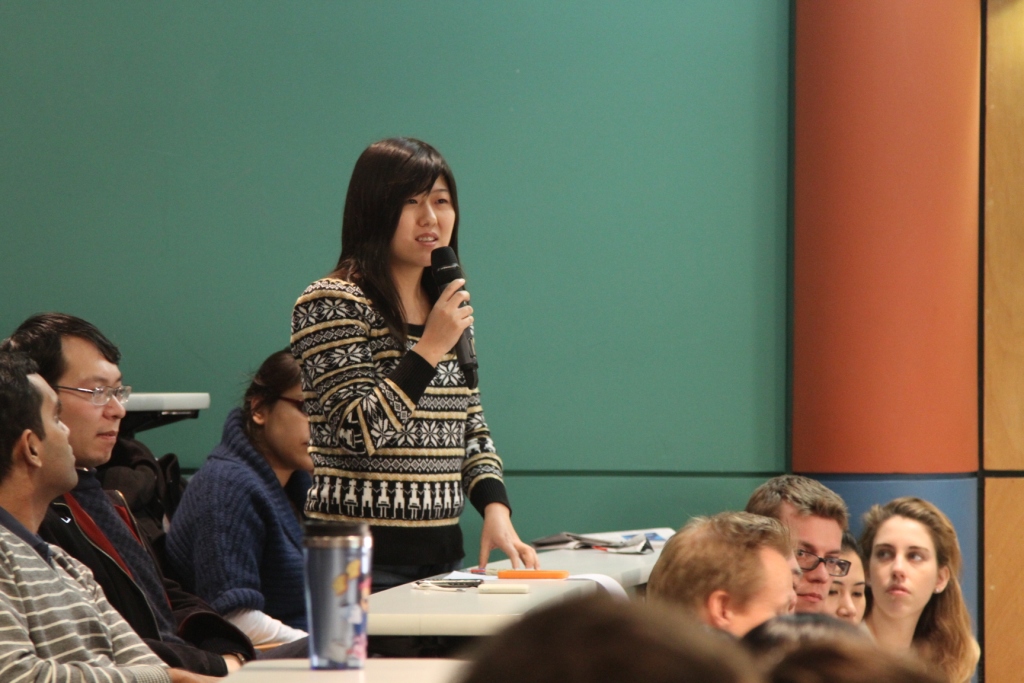
Ambassador Liu said that China is confident to sustain a rapid growth. According to the Twelfth Five-year Plan formulated by China, the country will carry out a strategic economic restructuring, actively promote progress and innovation in science and technology better ensure and improve people's livelihood and build an energy-efficient and environment friendly society. China's development is conducive to the world peace, the world economy and the building of the international system, and therefore is a blessing, not a catastrophe to the world. It means opportunities, not threats.
Finally, Ambassador Liu stressed that China is embarking on a journey no country has ever made. This goes beyond the knowledge of human beings. He hoped the faculty members and students of Cambridge would renew their efforts in tapping the rich resources China has to offer and lead the UK and the world in studying and understanding today's China.


Ambassador Liu's simple but profound speech won rounds of applause from the teachers and students and aroused their deep reflections. Teachers and students eagerly asked questions such as: What have China and India learned from each other's development experience? How to help the Western society to better understand China? How to promote cultural exchanges between China and the UK? How will China cope with the widening wealth gap? How does China manage and use its huge foreign exchange reserves? How does China implement the "going global" strategy to expand investment abroad? What are the major challenges facing China's investment abroad? What overseas projects are Chinese enterprises most willing to invest in?
Ambassador Liu answered all the questions and stressed that China's development process is both to explore the path of development suited to its own situations, but also to learn the advanced experience from the rest of the world. China is ready to strengthen mutual understanding and better learn from each other with the international community. Indeed, the cultural exchange activities between China and the UK are colorful, the cultural exchanges between China and the West are constantly deepening and the Western society is increasingly interested in understanding China, but it is worth noting that the West has conducted relatively in-depth studies in ancient and modern China while lacks understanding of the contemporary China, particularly since reform and opening-up. To enhance such understanding, the two sides may strengthen cooperation in this field. China attaches great importance to the disparities in wealth, actively adopts policies to foster the development of backward areas and help people in need and strives to improve the living standards of all people. While developing its economic strength, China actively implements the "going global" strategy to promote the common prosperity of China and the world. Ambassador Liu also gave examples for the obstacles encountered by the Chinese enterprises during their investment in Western countries, and hoped that these countries would abandon the Cold War mindset and create a more friendly environment for the investment activities of Chinese enterprises.
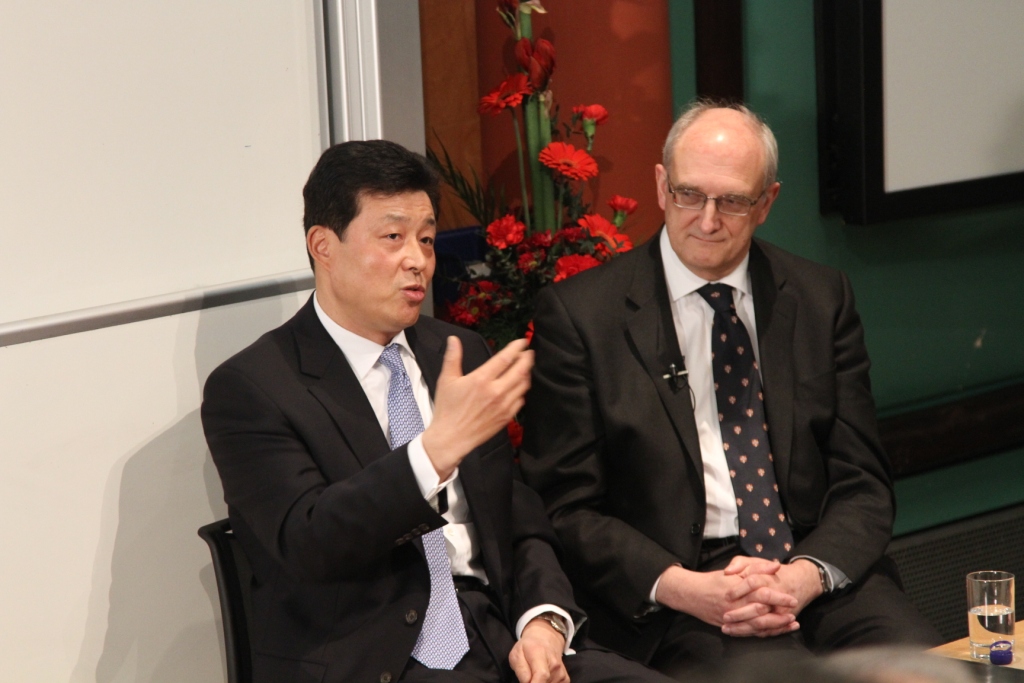
(Ambassador Liu answers questions. On the right is Vice Chancellor Borysiewicz)
After the speech, Ambassador Liu gave an interview to the Media TV of the University of Cambridge. Later on, the full text of Ambassador Liu's speech and the video of his interview were posted on the home page of the website of the University of Cambridge. That night, Vice Chancellor Borysiewicz and Mrs. Borysiewicz hosted a dinner in honour of Ambassador Liu, Madam Hu and their party in the Vice Chancellor's official residence. Professors and scholars of the University of Cambridge specialized in China studies attended the dinner and the two sides exchanged views on how Cambridge will strengthen the researches in contemporary China.
When Ambassador Liu, Madam Hu and their party left the Vice Chancellor's official residence, the night has grown dark. Under the twinkling stars they waved goodbye to the hosts, leaving behind understanding and friendship and taking away trust and cooperation.

(Ambassador Liu gives interview to the Media TV of the University of Cambridge)

